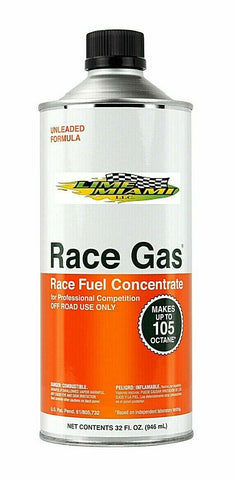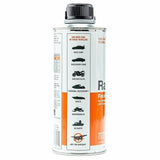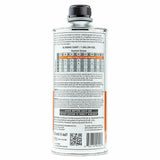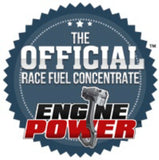
Fuel Additive Model or Series: Race Fuel Concentrate
Additive Type: Octane Booster
Volume: 32 oz
Maximum Octane: 105 Octane
Volume of Fuel Treated: Up to 16 Gallons (depending on desired octane)
Quantity: Sold As Each
TESTED PERFORMANCE:
Unlike some other additives, RACE GAS has been rigorously tested by independent laboratories, prominent engine builders, and performance tuners.
REAL RACING FUEL:
When blended to the proper ratio, RACE GAS can take your ordinary pump gasoline and transform it into high octane, high energy, track grade racing fuel. RACE GAS will keep you from ever running out of racing fuel.
In working with several chemists and our suppliers we came up with the blend that became RACE GASTM. When we had a third party laboratory run the ASTM D 2699 and 2700 tests, Race Gas blended with pump gas produced results as good as racing with regularly distilled 100 octane gasoline, See the test results. This blend will improve the quality of regular "pump gas" and make it suitable for racing - why? Because RACE GASTM adds back in the key elements of racing fuel - hydrocarbons, oxygenates, and organometallic compounds:
- Fuel Hydrocarbons: Fuel Hydrocarbons are compounds that contain both Carbon and Hydrogen that, when burned, produce water (H2O) or Carbon Dioxide (CO2). Saturated Hydrocarbons have a high octane rating and carry additional carbon atoms which produce more energy when burned. They also produce a synergistic effect when used with certain organometallic compounds to product higher octane ratings than if they are used by themselves.
- Oxygenates are one of the most misunderstood compounds in gasoline. While many have heard of the negative effects of oxygenates like Ethanol and Methanol not all oxygenates are created equal. Oxygenates play a very important role in high octane gasoline. Like the name suggests oxygenates add oxygen to gasoline. As we all know our engines need oxygen to burn fuel. By adding an oxygenate to RACE GASTM we are adding that crucial oxygen to the fuel which, in turn, allows the engine to burn fuel more completely thereby taking advantage of the additional carbon atoms added by the fuel hydrocarbons. The net result is more horsepower! The oxygenates that are used in Race Gas are not derived from alcohol like methanol and ethanol and therefor do not damage fuel system and engine components like these oxygenates do.
- Organometallic compounds are added to gasoline to increase the octane of the fuel. Up until recently Tetra Ethyl Lead was used in gasoline for this purpose. In addition lead was used as a lubricant on older engines that didn't have hardened valve seats. The problem with lead in gasoline, (other than the environmental effects), was the fact that scavenger compounds needed to be added to gas in order to keep the lead from creating deposits on pistons and cylinder heads. When the EPA banned lead in fuel refiners turned to other metallic compounds like Manganese, Iron, Nickel and Magnesium. All of these different compounds have their pros and cons. We believe that Manganese has the best overall effect on octane and the best synergistic effect with the other compounds in Race Gas. As a result Race Gas contains high quality Methylcyclopentadienyl Manganese Tricarbonyl or MMT.
Moreover, we know that RACE GASTM is safe for cars even under the most demanding conditions. We have burned RACE GASTM in everything from a 944 Turbo race car, a modified Audi TT, a Hemi Magnum, a Hemi Challenger, and modified VW R32, a Corvette and many other cars. All showed increases in power, throttle response and torque, (you can see the dyno test results of many of these cars on our test results page at [link removed by eBay]).
Try a can of RACE GASTM and you'll find what everyone is finding - that RACE GASTM really works, turning ordinary pump fuel into RACE GAST
RACE GAS RACE FUEL CONCENTRATE FAQS
WHAT DOES A FUEL'S OCTANE RATING MEAN?
Octane rating is the standard of measure of the performance fuel in an engine. The octane number is an indicator of the fuel's tendency to burn in a controlled manner versus exploding in an uncontrolled manner. Fuels with a high octane rating and withstand higher compression before detonating or "knocking". Higher compression could be from high compression ratio of the piston / cylinder combination, the use of a super charger or turbo charger, or Nitrous oxide injection.
WHAT IS “DETONATION / KNOCKING / PINGING”?
Detonation, (also called knocking or pinging), is when the fuel in the cylinder fires before the completion of the compression stroke. When detonation occurs the flame front of the combustion is uneven across the piston. The net result is the piston will “rattle” from side to side in the cylinder creating the knocking or pinging sound.
THERE ARE SEVERAL OCTANE NUMBERS FOR GASOLINE. WHAT DO THEY MEAN AND WHICH ONE SHOULD I CARE ABOUT?
There are 3 octane ratings commonly used in the US. Research Octane Number (RON), Motor Octane Number (MON) and Anti-Knock Index (AKI or (M+R)/2). Let's look at each of these individually.
Research Octane Number (RON): RON is the "laboratory" measurement of octane. The octane number is determined by running the fuel in a CRF Test Engine and varying the compression of the engine until the fuel "detonates" or Knocks. The engine is not under "load" and as a result RON numbers generally run higher than the other octane numbers.
Motor Octane Number (MON) is measured using the same CRF engine test however the engine is placed under a "Load" of 900 RPM. This test is a better indication of octane because it better simulates the octane in a real world setting, i.e. under load. MON numbers run lower than RON numbers.
AKI or (R+M)/2 is the Anti-Knock Index. This number is the average of the MON and RON numbers. This number is the most important because it averages the octane under load and at idle. This is the number that you should care most about. When a car company or an engine builder specifies a fuel's octane number for an engine, AKI is the number they are referring to.
WHEN SOMEONE REFERS TO A "POINT OF OCTANE" WHAT SPECIFICALLY DO THEY MEAN?
The scale of octane is a point of confusion for even seasoned motor sports enthusiasts and is a very important issue when evaluating octane enhancement products. A point of octane is 1/10 of an octane number. For example if you increase the octane of 87 pump gas by 8 "points" you are increasing the octane to 87.8. Many consumers see products on the shelf that promise to raise the octane by "10 points" and think that it will raise the octane by 10 octane numbers. That is not the case. Other suppliers rely on this confusion to sell their products. Don't be fooled!
HOW IS RACE GAS DIFFERENT THAN OCTANE BOOST PRODUCTS?
First, octane boosters only add a few points of octane and cannot raise the octane of pump gas to that of racing fuel. What many people don't know is that a point of octane is 1/10 of an octane number. For example, if an octane booster says it raises octane by 9 points and it is blended with 87 octane fuel the final octane number will be 87.9 not 96.
Second, octane boosters will raise the octane they don't increase the chemical energy of pump gas. This is because they are not adding the high quality fuel aromatics that are used in RACE GAS. As a result your engine will not "ping" but it will not generate as much power as it would using RACE GAS.
I CAN'T GET HIGH OCTANE GAS FOR MY BOAT AT THE MARINA. CAN I USE RACE GAS IN MY BOAT?
Yes! RACE GAS will work in any engine that requires high quality, high octane fuel. RACE GAS can be used in:
- Cars
- Snowmobiles
- Motorcycles
- Boats
- Personal Water Craft
- Go Karts
-
WILL RACE GAS HARM MY O2 SENSORS OR CATALYTIC CONVERTER?
No. RACE GAS does not contain lead or other additives that can harm O2 sensors or catalytic converters.
I NOTICED THAT MY SPARK PLUGS HAVE AN ORANGE DUST ON THEM AFTER RUNNING RACE-GAS IN MY TANK. ARE MY PLUGS FOULED OR SCORCHED?
No! The dust you are seeing is the bi-product of burning fuel with manganese. This dust does not affect plug or exhaust components in any way.
If you are old enough to remember burning leaded fuel, or look at the plugs from someone burning leaded racing fuel, you will see a greyish white dust on the plugs and exhaust pipes. This is the bi-product burning leaded fuels. This dust has no effect on plug performance and will not damage the engine either.
To insure that this dust doesn’t affect engine performance we have been burning fuel blended with RACE-GAS in many cars for the last 3 years. We have added RACE-GAS to every fill up in a Toyota, BMW, VW, Porsche and a Ford for 3 years with no negative effect on the plugs, catalytic converter or O2 sensors. In addition we have 3 race cars with an average of 140 race hours on them using RACE-GAS and have seen no issues. Lastly Tesar Engineering ran 3 Mustangs in the 2,000 Carrera Pan Americano using Mexican pump gas blended with RACE-GAS with no problems and great performance, (See the Testimonials page to read the full story).
IF A LITTLE RACE GAS IS GOOD, WOULDN'T A LOT BE EVEN BETTER?
No! It is possible to "over octane" an engine. While the effects on the engine are less than "under octane", the engine will not perform as well as it would with the right octane fuel. We encourage our customers to talk with their engine builder or people with similar engine configuration to determine the "right octane" for your car.
The chart below represents a good estimate of octane requirements by compression ratio. It is not specific to your engine so you may want to blend your fuel to an octane number or two higher than what is listed below.
Compression Ratio Octane Number Requirement 5:1 72 6:1 81 7:1 87 8:1 92 9:1 96 10:1 100 11:1 104 12:1 108 It is important to note that the octane numbers above are the "Anti Knock Index" number or (R+M)/2.
WILL RACE GAS BENEFIT A STOCK / STREET CAR?
It depends on the car. High performance cars like a Corvette, Viper, Porsche or BMW and turbo charged cars like a WRX will see improved throttle response and power. Cars with carburetors can be tuned to run RACE GAS and will see more power, (changes will need to be made to the carburetor jets and the timing). Regular cars like a Chrysler 200, a Ford Focus or a Toyota 4Runner will not see a great deal of improvement.
It is important to remember not to "over octane" your engine as this will cause a decrease in performance.
International buyer please note:
Import duties, taxes, and charges are not included in the item price or shipping cost. These charges are the buyer's responsibility.
Please check with your country's customs office to determine what these additional costs will be prior to bidding or buying.





